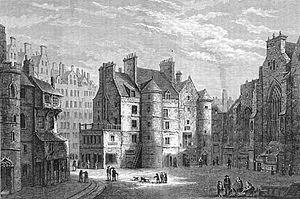The Heart of Midlothian
 Effie Deans by John Everett Millais Effie Deans by John Everett Millais | |
| Author | Sir Walter Scott |
|---|---|
| Sprache | English, Lowland Scots |
| Series | Tales of My Landlord (2nd series); Waverley Novels |
| Genre | Historical novel |
Publication date | 1818 |
| Publication place | Scotland |
| Media type | Print (Hardback & Paperback) |
| ISBN | NA Parameter error in {{ISBNT}}: invalid character |
The Heart of Midlothian is the seventh of Sir Walter Scott’s Waverley Novels. It was originally published in four volumes on 25 July 1818, under the title of Tales of My Landlord, 2nd series, and the author was given as "Jedediah Cleishbotham, Schoolmaster and Parish-clerk of Gandercleugh". Although the identity of the author of the Waverley Novels was well-known by this time, Scott still chose to write under a pseudonym. The book was released only seven months after the highly successful Rob Roy. Scott was at the time recovering from illness, and wrote at an even more furious pace than usual. When the book was released, it more than matched the popularity of his last novel.
Much of the dialogue is in Lowland Scots, and some editions carry a glossary.
Plot summary

The title of the book refers to the Old Tolbooth Prison in Edinburgh, Scotland, at the time in the heart of the Scottish county of Midlothian. The historical backdrop was the event known as the Porteous Riots. In 1736, a riot broke out in Edinburgh over the execution of two smugglers. The Captain of the City Guards, Captain John Porteous, ordered the soldiers to fire into the crowd, killing several people. Porteous was later killed by a lynch mob who stormed the Old Tolbooth.
The second, and main element of the novel was based on a story Scott claimed to have received in an unsigned letter. It was about a certain Helen Walker who had travelled all the way to London by foot, in order to receive a royal pardon for her sister, who was unjustly charged with infanticide. Scott put Jeanie Deans in the place of Walker, a young woman from a family of highly devout Presbyterians. Jeanie walks to London hoping to achieve an audience with the Queen through the influence of the Duke of Argyll.
Jeanie Deans is the first woman among Scott's protagonists, and also the first to come from the lower classes. While the heroine is idealized for her religious devotion and her moral rectitude, Scott nevertheless ridicules the moral certitude represented by the branch of Presbyterianism known as Cameronians, represented in the novel by Jeanie’s father David. Also central to the novel is the early-18th century Jacobitism, a theme found in so many of Scott’s novels. Scott’s sympathies can be seen in the ideal figure of the Duke of Argyll, a moderate on these issues.
The Heart of Midlothian has been adapted for the screen once, in 1914, and for television once, in 1966. Two operas have also been based upon the novel - La Prigione di Edimburgo (Imprisoned in Edinburgh) by the Italian composer Federico Ricci (1809-1877) and Jeanie Deans by the Scottish classical composer, Hamish MacCunn (1868–1916).
Characters in "The Heart of Midlothian"
- Jeanie Deans, young woman and heroïne of the novel
- David Deans or Davie Deans, father of Jeanie and staunch Cameronian.
- Effie or Euphemia Deans, sister of Jeanie, the 'Lily of St. Leonards'
- Reuben Butler, fiancé of Jeanie Deans
- Bartoline Saddletree, saddle maker and employer of Effie
- Dumbiedikes, a laird, in love with Jeanie Deans
- George Robertson, alias George Staunton, villain of the novel
- Madge Wildfire, alias Magdalen Murdockson, mad woman
- Meg or Margaret Murdockson, mother of Madge.
- Duke of Argyle
- Queen Caroline
